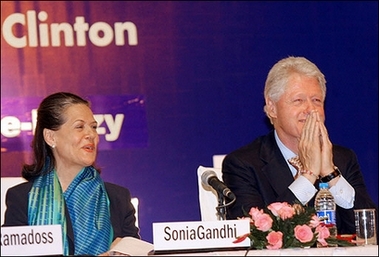Clinton announces affordable AIDS treatment for kids
(China Daily)Updated: 2006-12-01 07:19
Former US President Bill Clinton announced an agreement yesterday to cut
prices of HIV and AIDS treatments for children, making the lifesaving drugs far
more accessible worldwide.
Two Indian pharmaceutical companies have agreed to supply
antiretroviral, or ARV, formulations for HIV-positive children at prices as low
as 16 US cents a day, or US$60 annually, Clinton said in a speech at a New Delhi
children's hospital ahead of World AIDS Day today.
"This breakthrough is a great example of what we can do together. This is a great day, but we have a long way to go. We have to make a new commitment that every child and adult who needs treatment should have access" to the drugs, Clinton said.
Under the agreement, the two companies Cipla Ltd and Ranbaxy Laboratories Ltd will supply 19 different ARV formulations for prices that would be around 45 per cent less than the lowest current rates for these drugs in developing countries, he said.
"Though the world has made progress in expanding HIV/AIDS treatment to adults, children have been left behind. Only one in 10 children who needs treatment is getting it," Clinton said.
In January, Clinton negotiated the reduction of prices of rapid HIV tests and anti-AIDS drugs for adults. Several Indian firms were involved in that deal too.
UNITAID, the international drug purchase facility, established in September by France, Brazil, Chile, Norway and the UK, would help subsidize the programme.
Under the deal, UNITAID would provide US$35 million and the Clinton Foundation HIV/AIDS Initiative would contribute US$15 million, which would enable an additional 100,000 HIV-positive children in 62 countries to receive treatment in 2007.
The drugs will be supplied to the national governments of these countries for distribution through their public health and HIV/AIDS prevention programs.
Clinton was speaking at the Kalawati Saran Hospital, one of New Delhi's busiest hospitals for children, at the launch of a new national programme by the Indian Government to treat HIV-positive children. India, with 5.7 million HIV-positive people, has the highest number of cases in the world.
The new deal would provide HIV treatment for 10,000 Indian children by March 2007 by adding pediatric care to all adult HIV and AIDS treatment centers in the country.
|
||
|
||
|
|

